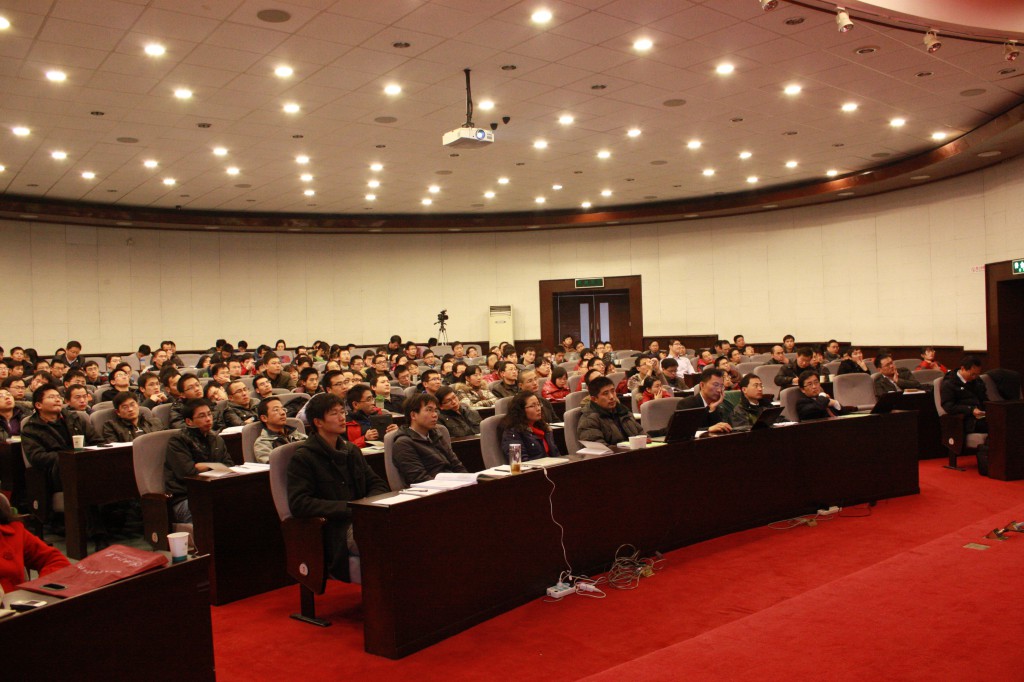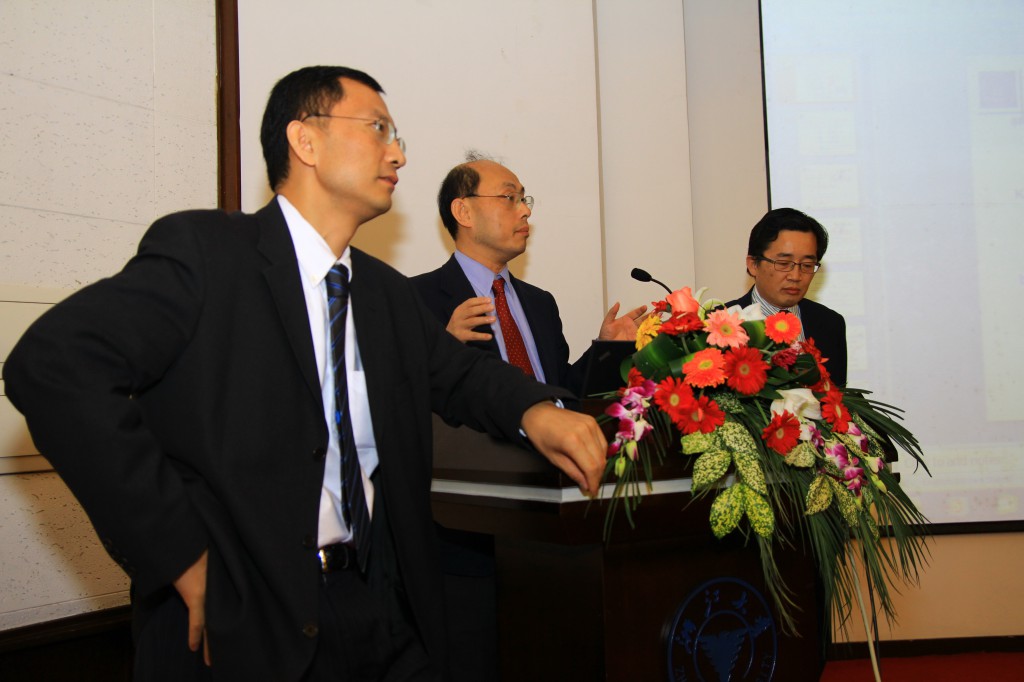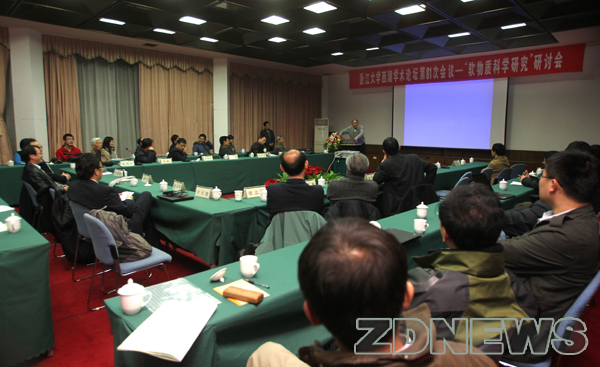Jointly sponsored by the National Natural Science Foundation of China (NSFC) and Ministry of Education of China, “The Advanced Course on Mechanics of Soft Matter” and “The Graduate Summer School on Mechanics of Soft Matter” were successfully held at Yuquan Campus of Zhejiang University (ZJU) between December 21st, 2011 and January 4th, 2012.
Nearly 170 participants and more than 50 audiences from all over the country attended the two-week workshop. The activity has been financially supported by the NSFC, Ministry of Education of China, Graduate School of ZJU, organized by the Chinese Society of Theoretical and Applied Mechanics (CSTAM) and Beijing International Center for Theoretical and Applied Mechanics (BICTAM), and co-hosted by the Soft Matter Research Center (SMRC) and Institute of Applied Mechanics of Zhejiang University.
Different from ordinary solids, liquids and gases, soft matter is a subfield of condensed matter comprising a complexity of physical states and softness that is easily induced by thermal stresses or thermal fluctuations, with the featured sensitivity to tiny stimuli from the environment. The soft matter research, involving mechanics, physics, biology, material science, chemistry and other fields, is considered to be “the science of the 21st century” and there have been rapidly growing activities in the past years. The purpose of this workshop was to exchange the cutting edge research, integrate research strength and effort in the field, promote the growth of young scholars, and boost development of fundamental research on soft matter mechanics and related disciplines in the country.
In the opening ceremony on 22nd morning, the proponent of this workshop, Northwestern University Chair Professor Yonggang Huang briefly introduced “the NSF Summer Institute on the Mechanics of Soft Materials” held at Northwestern University in May 2011. He pointed out that the huge success of the NSF Summer Institute lies on the fact that soft matter mechanics sheds lights on the future of mechanic research and opens up a new field of scientific prospects. Executive Dean of ZJU School of Aeronautics and Astronautics, Professor Yao Zheng welcomed the experts and students to the campus, outlined the history, status and development strategy of the school, and prospected the application of soft matter mechanics for the aerospace projects in the country. Deputy Director of the ZJU Graduate Education Office, Ms. Liping Zhang presented the statistics of graduate education at Zhejiang University, and wished the participating students to take advantage of the opportunity and improve their research capability from the course.
Lecturers included 21 distinguished scholars from top universities or institutions in China and USA. They are: Zhigang Suo (Harvard University), Huajian Gao (Brown University), Yonggang Huang (Northwestern University), Tianjian Lu (Xi’an Jiaotong University), Quanshui Zheng (Tsinghua University), Xiqiao Feng (Tsinghua University), Kunquan Lu (Chinese Academy of Sciences), Pengye Wang (Chinese Academy of Sciences), Ruhong Zhou (IBM Watson Research Center), Yongzhong Huo (Fudan University), Wen Chen (Hohai University), Wei Yu (Shanghai Jiaotong University), Hongru Ma (Shanghai Jiaotong University), Jinxiong Zhou (Xi’an Jiaotong University), Zheng Zhong (Tongji University), Haiyi Liang (University of Science and Technology of China), Yilan Kang (Tianjin University), Huihui Dai (City University of Hong Kong), Baohua Ji (Beijing Institute of Technology), Yuezhou Li (Zhejiang University), Weiqiu Chen (Zhejiang University). The well prepared and rigorously designed courses offered an exceptional “academic feast” to all the students and observers. The course contents covered active research topics including intelligent soft materials, cells and biological macromolecules, flexible electronic devices, biological tissues, hydrogels, granular flows, polymers, liquid crystals, colloids and other soft material systems. Closely linked analyses, simulations and experiments carried a broad range of knowledge and represented the frontiers of latest research in the exciting field.
Equally exciting with the course contents is the interaction and communication between the lecturers and trainees. For example on 23rd afternoon, Professors Zhigang Suo, Huajian Gao and Honggang Huang took the stage together and shared their motivation, inspiration and academic experiences of many years with the seated students and faculty. Huang suggested finding collaborators with different but complementary background and expertise, cited the view of his father, Professor Kezhi Huang (Member, CAS), using “sharpening hatchet” versus “chopping wood” to describe the different roles and characteristics of scientific research. Suo emphasized the importance of searching scientific problems in engineering background and necessity of training students based on their individual characteristics. He also raised two questions to be addressed before a new projected is started: “What’s new?” & “Who cares?”. Gao suggested the young researchers to work at the frontier of science developments. He believes that nowadays biological science and nanotechnology are rapidly advancing and there exists unprecedented opportunities at the interface between mechanics and these two areas. He also expected the students to gain not only the knowledge of fundamental mechanics and mathematics, but comprehension of other basic subjects such as physics, chemistry and biology. Suo, Huang and Gao all graduated form solid mechanics group at Harvard University and have established profound friendship since their studenthood. They have been engaged in mechanics research of more than 20 years and all made remarkable achievements in their respective fields.
On 23rd evening, Professor Wei Yang (ZJU president), experts, students and organizing committee gathered at “the 81st West Lake Academic Forum ― Soft Matter Science & Research Symposium”. Six speakers (Kunquan Lu, Ruhong Zhou, Yuqiang Ma, Zhigang Suo, Huajian Gao and Yonggang Huang, Yuqiang Ma being the director of the Center for Soft Condensed Matter Physics and Interdisciplinary Research of Suzhou University) presented reports on development of soft matter research. Professor Weiqiu Chen introduced the initiation of the Soft Matter Research Center, the key research areas and recent research progress in the center.


